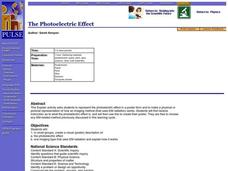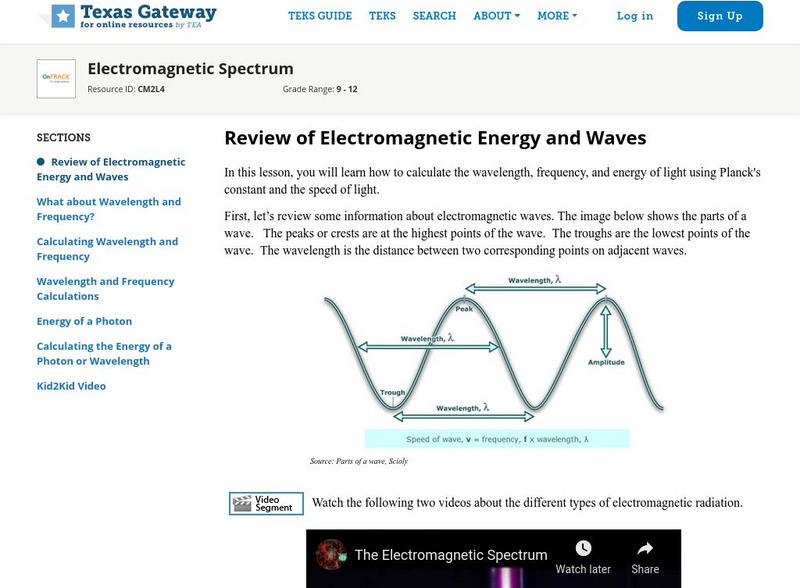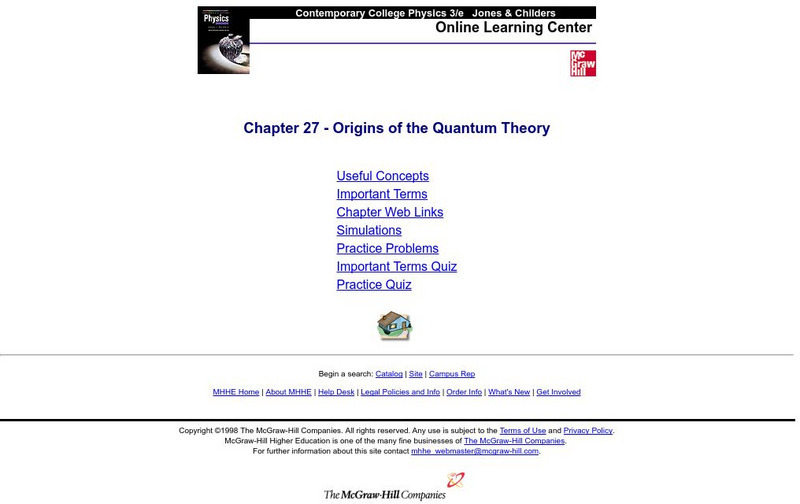Curated OER
The Photoelectric Effect
After some online instruction, chemistry aces use their creative abilities to produce a poster describing the photoelectric effect and one type of imaging technology that uses electromagnetic radiation. This simple, straightforward...
Curated OER
Energy of Waves
In this waves worksheet, students use various formulas to calculate the wavelength, energy and frequency of waves. This worksheet has 5 word problems.
Curated OER
WAVES AND PHOTONS
Learners examine the many types of electromagnetic waves, the concept of an EM wave, how James Clerk Maxwell proposed a slight modification of the equations of electricity, Heinrich Hertz and his radio-frequency, wavelengths, and light...
Curated OER
Evaluating Secondary Physical Constants
In this physical constants learning exercise, learners use fundamental physical constants of nature to determine "secondary" constants. This learning exercise has 7 problems to solve.
Curated OER
Atomic Theory
In this atomic theory worksheet, students use Planck's constant, Rydberg constant, and Avogadro's number to complete 20 multiple choice questions.
CK-12 Foundation
Ck 12: The Quantum Mechanical Model
[Free Registration/Login may be required to access all resource tools.] In the following online tutorial students will calculate the wavelength, frequency, and energy of light using Planck's constant and the speed of light. They will...
Texas Education Agency
Texas Gateway: Electromagnetic Spectrum
This tutorial explores using Planck's constant and the speed of light to calculate the wavelength, frequency, and energy of light.
Georgia State University
Georgia State University: Hyper Physics: Wave Particle Duality
The dualistic nature of light is discussed. The photoelectric effect and the Davisson-Germer experiment are contrasted as empirical evidence supporting each of the two views - particle and wave - of the nature of light. The photoelectric...
University of Colorado
University of Colorado: Physics 2000: Quantum Atom: Angular Momentum of an Electron
A very technical explanation of the angular momentum of an electron.
Science Education Resource Center at Carleton College
Serc: Quantum Physics: An Introduction
Interactive demonstration provides learners with an introduction to Quantum Physics. They will also be introduced to wave/particle duality, Heisenburg Uncertainty Principle, superposition, Schrodinger's cat, and wavefunction.
Georgia State University
Georgia State University: Hyper Physics: Photoelectric Effect
Using graphics, words and numbers, the photoelectric effect is described and explained. Planck's theory about quanta of light is explained. Photon energies for the various regions of the EM spectrum are listed. An interactive JavaScript...
Science Struck
Science Struck: Basics of Quantum Mechanics for Dummies
A good explanation of basic quantum theory.
McGraw Hill
Mc Graw Hill Companies: Origins of the Quantum Theory
An indexing page for Chapter 27 (Origins of the Quantum Theory) of the companion web site for McGraw Hill's Contemporary College Physics textbook. Includes several worthy pages with chapter notes, simple definitions, online computer...
University of Colorado
University of Colorado: Physics 2000: Planck's Constant and the Energy of a Photon
From the Physics 2000 web site. Planck's theory of quantized energy levels is explained. The concept of a photon is discussed and related to Planck's theory. Explanations are insightful and written in an easy to understand language which...













